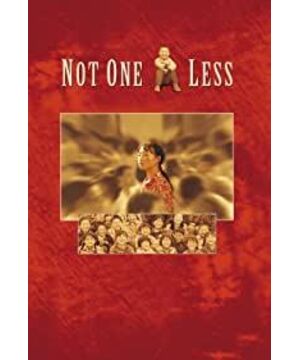"No One Can Be Missed" is another breakthrough of Zhang Yimou's documentary style after the film "The Case of Qiu Ju", and he also won the Golden Lion Award again with this unique style. Unlike the latter, "All One" "Can't be Less" is more realistic. On the basis of rough images, a large number of non-professional actors are used, and the camera is shifted from Chinese law to Chinese education. There is a great sense of contrast inside and outside the scene. The gap between the countryside and the city, Wei Minzhi and The changes in the fate of "Wei Minzhi" have produced extremely strong dramatic conflicts. Putting aside the surface and looking at the essence, Zhang Yimou perfectly explained the realities of Chinese social education at the end of the last century, deeply touching the hearts of every moviegoer.
Simplicity and authenticity are at the heart of this film. The broken buildings and barren land at the beginning of the film show the backwardness of China's remote rural villages at the end of the last century. I also wondered what the remote mountain villages in China are like at the moment? The conversation between the dark-skinned peasant village chief and Wei Minzhi revealed to us the "unbearable" local education. A real sense of nature emerged spontaneously, as if telling us that this is not a movie, but a real event. Wei Minzhi's All kinds of performance, talking with Zhang Huike and other children is something she should not do at her age. What's more interesting is that she agreed to "substitute classes" because of money, but later it evolved into finding Zhang Huike at all costs. This is a child A kind of stubbornness, a kind of "childishness", and more of it makes me feel that this is a kind of responsibility, a minor child is shouldering this kind of responsibility that most modern adult teachers can't bear. This is a unique feature of Chinese farmers.
When the film was filmed, compulsory education had been popularized in China for ten years, and how many backward areas were there like the Shuiquan Village in the film? When Wei Minzhi entered the city and began to "exile" in the city, looking for the clip waiting for the director of the TV station next to the gate of the TV station was the climax of the film. Zhang Yimou explained the gap between urban and rural areas from the perspective of a rural girl, interpreting the warmth of human feelings, but the simple storyline Showing a great loneliness, the confrontation between rural individuals and the "black" city, the individual is small, but with the help of the director's help, countless resources came, and on the other hand, without the help of the director, Wei Minzhi alone Whether Li can successfully find Zhang Huike, this is Zhang Yimou's irony of power. In the end, thanks to the help of the TV station, Shuiquan Village got the attention of the whole society, whether it was a show of celebrities or out of sympathy, education in China should get the attention of the whole society, not only for a "famous" village, but also for Countless children await this attention. We, too, have books to read and learn. In the contemporary era when social media is developing thousands of times faster than at the time, we should not just struggle in the vanity fair and forget why we set out, but ask ourselves if we want to be teachers of the people. What is the purpose.
Parents' educational awareness, local educational resources, and social education system are all the problems that lead to Shuiquan Village. Zhang Yimou showed the social status quo to the world because of his conscience as a director, and the feedback to us was that he hoped that we could become teachers. The conscience of the film and the realities reflected in the film with a strong documentary style have broken through the feelings brought by ordinary feature films. After decades of development, China's education system has a long way to go. The development of educational resources, the improvement of people's living standards, and the strengthening of educational awareness are the efforts of our country, and what we should do as a backup force in the front line of education is that everyone should become "Wei Minzhi".
View more about Not One Less reviews








